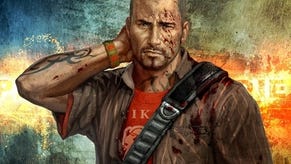Squeezed Middle
Life as a second-tier publisher is no longer tenable.
The problem here is one of balancing risk. If you want serious blockbuster title, you're faced with much higher bars to entry than ever before - so you have to be prepared to spend a lot of money. However, once that kind of money is on the line, it's extremely hard to avoid an intense dose of risk-aversion, which casts aside any kind of sweeping originality in favour of copying successful formulae and trying to claw onto any passing cultural zeitgeist.
Thus you end up with a game like Homefront - which, for all its production values and the undoubted talent of the team behind it, falls into the role of being a camp follower for Call of Duty, a position which undoubtedly limits its potential as a break-out franchise. This is exactly the problem which mid-range publishers face at this point - top-tier title development and marketing budgets are so high that it seems suicidal to back anything original, but without doing so, it's nigh-on impossible to establish a meaningful franchise and start properly playing in the big leagues. Catch-22.
This isn't to say that THQ won't get anywhere with Homefront - although so openly inviting constant comparisons with Call of Duty is unlikely to do the game any favours either critically or commercially in the long run. As an illustration of the problems faced by companies big enough to fund large titles, but not big enough to comfortably absorb the loss from a big title flopping completely, though, it's a good illustrative case.
Of course, the creative issue at the heart of this problem - that of cloning successful titles as an antidote to risk - is decades old. Every successful title generates clones, and while they're usually creatively bereft, some of them even make a genuine contribution to gaming. The evolution of the medium, after all, usually happens not through revolutionary leaps forward but rather through the accumulation of new ideas, better presentation and technological progress applied to well-understood existing genres.
"Either learn the ropes of an emergent platform and capitalise on that niche, or aim for the top with big-hitting, high-budget titles."
The difference now lies in the sheer level of risk at play. The huge decline in THQ's stock price this week shows just how heavily the company has bet on this individual title. Development costs have skyrocketed, but so too have marketing costs for any game that wants to notch up serious retail sales. If you're a major publisher with a catalogue of million-sellers, you can handle this. If you've spent the past decade getting by on a solid portfolio that's largely made up of second-tier games, though, the numbers are now looking very, very frightening indeed.
So, wherefore the mid-range publisher? Like the top-ranked firms, the answers we're seeing so far are varied. THQ's approach is clear - having spent years working (largely successfully) to dispense with the negative, shovelware image which was once attached to the firm, it's now not content to be consigned to a rapidly shrinking mid-range publishing role. It's going to invest and aim for the top - but whether that can really work while it lacks the courage to let its big products step out from the shadows of last year's blockbusters is a major question. This is a company which has reformed itself massively in recent years, however, and its determination to reach the top may well overcome this hurdle, too.
For other firms, as the budgets involved spiral ever upwards, the window of opportunity is closing - and many are choosing to move sideways instead. Mobile and social gaming offer fresh pastures, albeit heavily contested ones. Portable platforms, including the upcoming 3DS, offer the chance to stay in the game without engaging with huge HD console budgets. Perhaps most exciting for former mid-range publishers, however, is the resurgence of the PC - a platform long written off due to piracy, which now appears to be coming into its own again thanks to digital distribution platforms and a proliferation of new price points and business models.
One thing is certain - the days of the second-tier publishers are numbered. It's only a matter of a few years before those firms will have made a choice - either learn the ropes of an emergent platform and capitalise on that niche, or aim for the top with big-hitting, high-budget titles whose success will propel you amongst the big boys. Some will succeed - THQ, hopefully, among them. Some, however, will die trying. As yet it's hard to guess which will be which.



